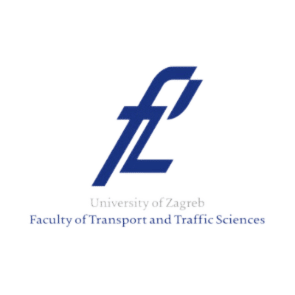TWINSAFE - .
General information
Call: HORIZON-WIDERA-2023-ACCESS-02
Topic: HORIZON-WIDERA-2023-ACCESS-02-01
Type of action: HORIZON Coordination and Support Actions
Granting authority: European Research Executive Agency
Starting date: 01.05.2024
Duration: 36 months (30.04.2027)
Budget: 1.499.250,00 EUR
Consortium:
The Faculty of Transport and Traffic Sciences (FTTS), established in 1984, is part of the University of Zagreb, and leading high education, scientific and research institution in the field of transport and traffic engineering in The Republic of Croatia. FTTS’s key research areas include activities in transport and traffic technology, transport safety, logistics, intelligent transport systems (ITS), aeronautics and related fields and the application of research results in the teaching process and transfer of knowledge. Faculty staff actively participates in national, regional, and international scientific, research and development projects as well as in public and commercial projects solving transport and traffic problems on national and international level.
FTTS is especially active in the field of road safety and has participated (as leader or partner) in several EU funded projects such as SLAIN, RADAR, SABRINA, SENSOR, NETSAFETY and Common specification for road markings and road signs. Moreover, FTTS conducted a number of road safety assessments through EuroRAP and iRAP program – overall more than 47 500 kilometers of roads has been surveyed. Due to the extensive experience in road safety assessment, FTTS has become iRAP Center of Excellence. Also, FTTS has an accredited testing laboratory, in accordance with EN 17025, for quality assessment of road markings and signs, and has been conducting dynamic and static measurements of retroreflection of road markings and signs for more than a decade both in Croatia and abroad. Furthermore, FTTS actively participated in preparation of national education courses for road safety audits and inspection (RSA/RSI), syllabus and manuals, as well as national regulations and guidelines related to road signalling and equipment, temporary road regulations and safety measures for roadworks, and design, construction and maintenance of road guardrails. In addition, FTTS is official training institution for road safety auditors and has conducted numerous road safety audits as well as many projects and studies in the field of road safety.

The Transportation Research Institute (IMOB) is a research center (www.uhasselt.be/imob) within Hasselt University focussing on fundamental and applied research in road safety and transportation modelling. In 2023, IMOB celebrates its 20th anniversary. Over two decades, IMOB has built a strong track record in transportation and road safety research. According to EduRank, UHASSELT ranks first among all Belgian universities in the field of Transportation Engineering (https://edurank.org/engineering/transportation/be/). In Europe, UHASSELT ranks place 21 in the field of Transportation Engineering, out of 213 universities.
Today, the center counts 50 staff members in total, consisting of faculty members, PhD students, post-doctoral researchers, technical, IT and administrative personnel. IMOB is an active partner (and also coordinator) in several international projects (e.g. Horizon 2020, Horizon Europe, DG MOVE, Marie Curie Doctoral Networks) and translates research results into market-ready products and services through valorisation and spin-off creation.
The road safety research unit (20 staff members) within IMOB focuses on research in road safety and human factors concerning road infrastructure and vehicle technology. As a result, research is strongly focused on monitoring, understanding, and intervening in human traffic behaviour. Appropriate research methods and techniques developed in our research include: driving simulation for infrastructure evaluation, cameras, drones, and software for traffic conflict observation, in-vehicle data event recorders and cameras, a platform consisting of hard- and software for driver style monitoring and gamified driving style interventions, etc.
IMOB is a systematic research and consultancy partner in road safety and infrastructure-related projects for the Flemish Government and the Flemish Roads Agency. Among the main competitive advantages of IMOB are:- Multidisciplinary approach to road safety with staff from different backgrounds and expertise (transportation, psychology, economics, engineering, statistics, geography)
- Linked undergraduate and graduate education programme (3y Bachelor + 2 year Master) in Transportation Sciences, as well as PhD program (4 years).
- Strong focus on internationalization (participation in international research projects and research and educational partnerships, e.g., Qatar University, Vietnamese-German University, Addis Ababa University)
- Strong focus on valorisation of research (research incubation, spinoff creation)
- Civic university: UHASSELT wants to contribute strongly to the region in which it is embedded by identifying the needs of the region and contributing with strong research and education that is relevant for the region.
Lund University is Scandinavia’s largest institution for education and research; it is consistently ranked among the world’s top 100 universities. The university has about 40,000 students in eight faculties. The Transport and Roads unit at the Department of Technology & Society has long been active in research on road safety with a special focus on assessing the effects of ITS solutions and the development of observational methods (e.g. The Swedish Traffic Conflicts Technique). It has a multidisciplinary composition with civil engineering, transport, economics and social sciences expertise. The unit has about 30 permanent staff members. Teaching activities include both undergraduate and postgraduate programmes and courses, as well as the training of professionals. Lund University, through the Transport and Roads division, has considerable experience in leading and participating in EU projects connected to traffic safety. The unit has participated in projects within the PROMETHEUS and DRIVE programmes, as well as in the 4th, 5th, 6th, and 7th EU framework programmes and Horizon 2020 (AdaptIVe, ARTEMIS, ARTISTS, BALTRIS, COST 319, DECADE, InteractIVe, MASTER, PORTAL, PREVENT, PROSPER, SASPENCE, WALCING, and the recently concluded InDeV). The traffic safety group is actually coordinating two Horizon Europe projects (a RIA project “Safe System for radical improvement of road safety in low- and middle-income African countries-AfroSAFE” GA: 101069500, and an ERC StG “SUrrogate measures for SAFE autonomous and connected mobility-SUperSAFE” GA: 101039222”).
More specifically, Lund University is a leading institution in the field of traffic safety in Europe and worldwide. The Transport & Roads division of the Department of Technology and Society at Lund University has a very old tradition of research about Surrogate Measures of Safety (SMoS) and has been a pioneer in establishing an applicable proactive approach to traffic safety since the ’80s. The newly established Traffic Safety Virtual Reality Hub aims to expand the concept developed for the SMoS based on real-world observations to future mobility scenarios by using different levels of simulation. Considering the approaching transport automation, the target is to investigate the role of the infrastructure in the interaction between heterogeneous road users at different levels of connectivity and automation. All the research activities at Lund University are carried out under the umbrella of Vision Zero and its applicability through the transition to Safe System. The Swedish Vision Zero, officially adopted by European Commission, set the target of zero fatalities and serious injuries due to road casualties. All the components of the transport system should cooperate to become a safer system and any changes and new elements/vehicles should be tested to be safe but also not be a burden for other components. The Transport & Roads division is helping to develop at the National and European/Worldwide levels the concept and implementation of Vision Zero.
Project aim
The TWINSAFE project aims to strengthen road safety research capabilities at the University of Zagreb’s Faculty of Transport and Traffic Sciences through collaborative partnerships with two prominent European institutions: Lund University and Hasselt University.
The overarching vision of the TWINSAFE project is to position the Faculty of Transport and Traffic Sciences as a centre of excellence in multidisciplinary road safety research, education, and innovation. TWINSAFE will foster the exchange of knowledge and promote best practices, enhancing scholarly inquiry and innovation within the road safety domain.
The consortium consists of 3 partners: University of Zagreb, Faculty of Transport and Traffic Sciences (Croatia), Hasselt University (Belgium), and Lund University (Sweden). The project is coordinated by University of Zagreb, Faculty of Transport and Traffic Sciences, a leading high education, scientific and research institution in the field of transport and traffic engineering in the Republic of Croatia.
Project objectives
Objective 1: Analyse and assess the impact of road infrastructure on driving behaviour on rural roads, integrate behaviour data with GIS-informed road metrics, recommend infrastructure modifications based on Safe System Approach, and evaluate proposed interventions through simulation and end-user feedback.
Objective 2: Strengthen the Centre of Excellence for Road Traffic Safety (CERTS) at Faculty of Transport and Traffic Sciences and boosting its role as a leading institution in road safety research and practices.
Objective 3: To significantly enhance the research and innovation capabilities of Faculty of Transport and Traffic Sciences by embracing community-centric research methodologies, fortifying technology transfer capacities, and embedding innovation at the core of institutional culture, thus paving the way for both academic excellence and commercial valorisation.
Objective 4: Develop an inclusive, international, open and gender-balanced research environment with strong project management capabilities at Faculty of Transport and Traffic Sciences.
Objective 5: Enhance road safety proficiency through expertise dissemination and accreditation programs by sharing the unique road safety expertise of Faculty of Transport and Traffic Sciences with Lund University and Hasselt University.
Project impacts
1. Strengthening Scientific Excellence and Innovation – The TWINSAFE project creates a sustainable model that leads towards immediate improvements in road safety with long-term enhancements in scientific collaboration, innovation, and community engagement. The project’s methodologies, tools, and frameworks will serve as a blueprint for other Widening countries, contributing to the strengthening of the broader European R&I ecosystem.
2. Skills Development Capacities and Education – The TWINSAFE project actively fosters collaboration between academia and industry by creating a network that integrates universities, research centers, public entities, and businesses. Through partnerships with technology transfer offices, direct engagement with key stakeholders, incubation support, and the development of joint educational curriculum, it bridges the gap between academic exploration and practical business needs. This cohesive approach not only strengthens the links between these sectors but also opens new career pathways, making TWINSAFE a catalyst for innovative collaboration and career advancement.
3. Technology Transfer and Commercialization – The direct synergies that will be established with the Technology Transfer Office of the University of Zagreb will be the kick starter for catalysation of the incubation and commercialization of innovative technologies in the domain of road safety.
4. Infrastructure and Policy Development – The TWINSAFE project is strategically designed to foster collaboration and innovation in the field of road safety, serving as a catalyst for structural changes in R&I systems within widening countries. By creating collaborative frameworks, specialised research hubs like Centre of Excellence for Road Traffic Safety (CERTS), and emphasizing technology transfer, it paves the way for a modernized R&I landscape. Its commitment to education, skills development, and stakeholder integration ensures a responsive and competitive R&I community.
5. Community Engagement, Knowledge transfer and Visibility – The TWINSAFE project exemplifies a global approach to research and innovation by forming an international consortium. This collaboration extends the reach of regional actors to an international platform, allowing for the exchange of expertise, best practices, and technological solutions.
6. Replication and Scale – The knowledge transfer that will take place during the project among the partners will results in building the capacities of all participating actors, not only direct and supporting partners in Croatia, which is a goal of Twinning programme in its essence. Moreover, the methodologies, tools, and collaborative frameworks developed through the project could be updated and replicated not only in the participating countries but in other Widening countries as well and as such contribute to building of R&I capacities at much broader scale.


